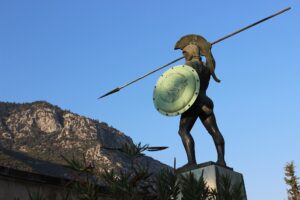 In Ancient Greece, people often expressed loyalty to and took pride in their local communities. In some cases, city states vied with one another to extend their influence across the region. One of the most famous rivalries arose between the cities of Athens and Sparta. Historians believe this competition contributed to the divisive Peloponnesian Wars that occurred between 431 B.C. and 405 B.C.
In Ancient Greece, people often expressed loyalty to and took pride in their local communities. In some cases, city states vied with one another to extend their influence across the region. One of the most famous rivalries arose between the cities of Athens and Sparta. Historians believe this competition contributed to the divisive Peloponnesian Wars that occurred between 431 B.C. and 405 B.C.
Athens
Although the people residing in Athens and Sparta shared much in common, the two cities also possessed many different traditions and values. Athens, in Attica occupied a well-fortified position overlooking the waters of the Mediterranean Sea. It maintained a good location for developing a port and conducting trade.
Athenians enjoyed a period of flourishing arts, sciences, and economic prosperity during the years between the defeat of an invading force from Persia and the beginning of the Peloponnesian Wars. Its residents experienced a “Golden Age” of great prestige and civic pride. While many residents of Athens could not vote (including women and slaves), the city did offer greater political freedom than many other communities in the ancient world. Athens produced leading architects, writers, scientists, and educators during this period.
Sparta
In contrast, Sparta in the region of Laconia in the Peloponnese, typically maintained a more authoritarian style of government. Sparta stood close to the Eurotas River in a scenic valley and for many years, the Spartans were able to depend on the mountains around them for defense and did not need to use city walls.
Kings ruled over Sparta, assisted by a Council of Elders and a small number of elected officials. The wealthiest male members of Spartan society served in Sparta’s military. During the Eighth Century BC, the Spartans had waged war against the nearby Greek city of Messene in the western Peloponnese. They conquered it and forced Messenia’s population to become Spartan slaves, which were called helots. These slaves were responsible for the day to day tasks such as farming and domestic care that helped keep the city-state functioning.
Sparta needed a strong fighting force even during periods of peace in order to maintain control over the large number of Spartan slaves. Unlike Athens, Sparta was a warrior society and encouraged both affluent men and women to pursue physical fitness. Some wealthy Spartan women participated in certain sports, and military training started for Spartan men at an early age. Loyalty to the state and service to the military were some of the most important ideals.
Important Shared Cultural Values
Despite the keen rivalry that developed between Athens and Sparta, the two city states did share many of the same cultural values. People in both locations celebrated athletic achievements and military prowess and bravery. They shared a love for the poetry of Homer and the adventures of heroes. In both cities, residents honored the Ancient Greek pantheon of gods and goddesses. They participated in religious festivals.
To some extent, these similarities possibly contributed to the intense competition between the two city states which eventually erupted in the Peloponnesian Wars. Many citizens of these communities likely wanted their own city to achieve the greatest power and influence among the Greek city states.
While Sparta ultimately prevailed during its conflict with Athens, it lost valuable resources during the struggle. Eventually, by 371 B.C., another Greek city state prevailed against Sparta in battle.
Source: